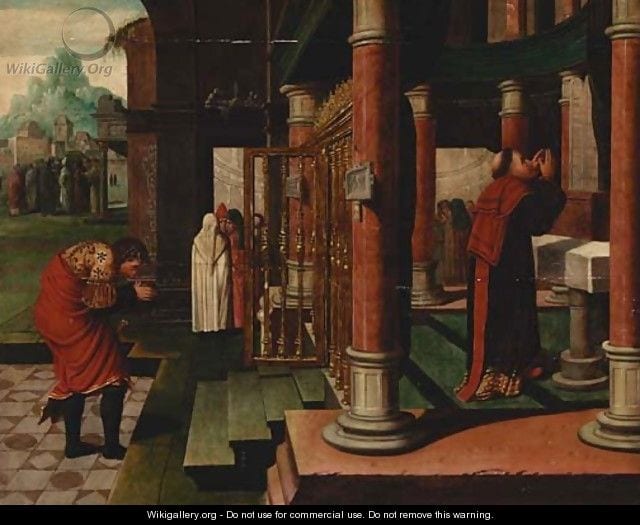
This coming week, on November 1st, many Christians will celebrate All Saints’ Day. Today, I will mark the thirtieth Sunday of Ordinary Time by honoring repentant sinners. I’m calling it “All Sinners’ Day.” As a son of the Reformation (which will also be celebrated this week on October 31st), I share Martin Luther’s view that the believer is simultaneously righteous and sinful. We are always completely dependent on Jesus, who is our righteousness. Apart from him, we stand before God as guilty—in a desperate state of unrighteous despair. We are blessed when we live as repentant sinners, abiding in God’s mercy.
One place where we find this emphasis in Luther is in an early Reformation treatise titled The Freedom of a Christian, which Luther dedicated to the Pope. Here Luther speaks of our being righteous in relation to Christ, not in ourselves. Luther uses marital imagery to convey this notion of relational union:
Who then can fully appreciate what this royal marriage means? Who can understand the riches of the glory of this grace? Here this rich and divine bridegroom Christ marries this poor, wicked harlot, redeems her from all her evil, and adorns her with all his goodness. Her sins cannot now destroy her, since they are laid upon Christ and swallowed up by him. And she has that righteousness in Christ, her husband, of which she may boast as of her own and which she can confidently display alongside her sins in the face of death and hell and say, “‘If I have sinned, yet my Christ, in whom I believe, has not sinned, and all his is mine and all mine is his,’ as the bride in the Song of Solomon (2:16) says, ‘My beloved is mine and I am his.’”[1]
Protestants following Luther are not alone in drawing attention to our desperate need for God’s mercy. A Catholic online publication marks this thirtieth Sunday in Ordinary Time by drawing attention to the parable of the self-righteous Pharisee and repentant tax collector praying in the Temple (Refer here). Let’s reflect on this same passage taken from Luke’s Gospel:
He also told this parable to some who trusted in themselves that they were righteous, and treated others with contempt: “Two men went up into the temple to pray, one a Pharisee and the other a tax collector. The Pharisee, standing by himself, prayed[a] thus: ‘God, I thank you that I am not like other men, extortioners, unjust, adulterers, or even like this tax collector. I fast twice a week; I give tithes of all that I get.’ But the tax collector, standing far off, would not even lift up his eyes to heaven, but beat his breast, saying, ‘God, be merciful to me, a sinner!’ I tell you, this man went down to his house justified, rather than the other. For everyone who exalts himself will be humbled, but the one who humbles himself will be exalted” (Luke 18:9-14; ESV).
As Luke’s Gospel reveals, Jesus directs his parable to those who trusted in themselves and their supposed self-righteous standing before God while looking down their noses at those around them. Jesus warns them and us today that those who exalt themselves will be humbled, while those who humble themselves will be exalted.
We find in this parable that the Pharisee’s prayer is self-referential, paralleling his self-righteous attitude. In other words, he thanks God that he is worthy of God’s favor given all his good deeds and his favorable standing in comparison with godless people, like this tax collector. In refreshing contrast, the tax collector does not praise himself or compare himself to others. He keeps his head down while beating his breast and crying out to God for mercy. Jesus declares that the tax collector goes home that day justified, but not the Pharisee. It reminds me of the psalmist’s words, which supposedly this Pharisee fails to recall:
For you will not delight in sacrifice, or I would give it; you will not be pleased with a burnt offering.
The sacrifices of God are a broken spirit; a broken and contrite heart, O God, you will not despise (Psalm 51:16-17; ESV).
We will return to this theme on Reformation Day. For now, we would do well to remember always that God exalts those who humble themselves and humbles those who exalt themselves. May our trust ever be in God, not ourselves, and may we never play the comparative righteousness game with others.
In closing, as we go to church this thirtieth Sunday in Ordinary Time, may we ever seek to keep in mind that the church is both a sanctuary of saints and a hospital of sinners. In fact, these two groups are really one. That is, the church is made up of saints who are sinners and sinners who are saints. May we wear both name tags today simultaneously (“Righteous” and “Sinful”) and introduce ourselves to others in good Lutheran fashion: “Hello, I’m ____, a repentant sinner and holy child of God saved by grace. So glad you’re here!” Moreover, may we encourage one another to live godly lives of gratitude daily in view of God’s amazing mercy and grace.
_______________
[1]Martin Luther, The Freedom of a Christian, in Martin Luther’s Basic Theological Writings (ed. Timothy F. Lull; Minneapolis: Fortress Press, 1989), page 604.












